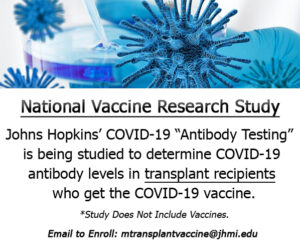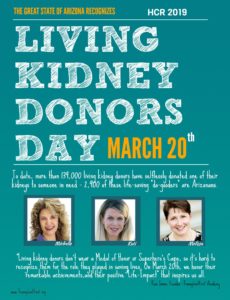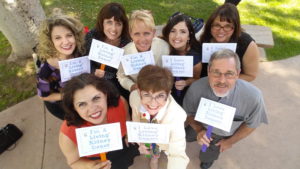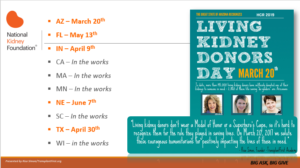 A new study for COVID-19 vaccine antibody testing is being led by the transplant team at Johns Hopkins. The purpose of this observational research study is to determine COVID-19 antibody levels in transplant recipients who get the COVID-19 vaccine. The study does not provide the vaccine or offer guidance as to whether or not one should receive a SARS-CoV-2 vaccine.
A new study for COVID-19 vaccine antibody testing is being led by the transplant team at Johns Hopkins. The purpose of this observational research study is to determine COVID-19 antibody levels in transplant recipients who get the COVID-19 vaccine. The study does not provide the vaccine or offer guidance as to whether or not one should receive a SARS-CoV-2 vaccine. Living Donor Protection Act of 2017
Living Donor Protection Act of 2017
WASHINGTON, D.C. – Congressman Jerrold Nadler (D-NY) and Congresswoman Jaime Herrera Beutler (R-WA) introduced the Living Donor Protection Act of 2017, to protect the rights of living organ donors. The Family and Medical Leave Act (FMLA) does not specify that living organ donors can take unpaid leave to recover from their donation and does not guarantee that donors will have a job waiting for them after surgery. The Living Donor Protection Act would protect living organ donors and promote organ donation in three easy, low-cost ways:
(1) Prohibits life, disability, and long term care insurance companies from denying or limiting coverage and from charging higher premiums for living organ donors;
(2) Clarifies that living organ donors may use FMLA time to recover from the surgeries and procedures involved in their donation; and
(3) Directs HHS to update their materials on live organ donation to reflect these new protections and encourage more individuals to consider donating an organ.
Learn more here: https://nadler.house.gov/press-release/nadler-herrera-beutler-introduce-bipartisan-living-donor-protection-act-protect-organ
 Living Kidney Donors Day
Living Kidney Donors Day
Monday, March 20th – Arizona Leads The Way in Recognizing Living Kidney Donors Day Join us at the State Capitol on March 20th for formal reading of Proclamation Resolution [HCR 2019] that honors Living Kidney Donors Day @ 1:30PM. Press conference to follow @2PM in the Rose Garden. Hear Rep Heather Carter read the proclamation, alongside Risa Simon, (founder of TransplantFirst Academy and proclamation pioneer) and Kati Walker, living kidney donor, peer mentor and advocate. Also in attendance will be the National Kidney Foundation of Arizona, a group of remarkable living kidney donors, kidney patient advocates and healthcare providers who passionately salute living kidney donors for giving life – and for inspiring ordinary people to seek extraordinary opportunities to do more and be kinder to one another. http://www.azleg.gov/press/house/53LEG/1R/170317CARTERKIDNEY.pdf

How to Optimize Kidney Donor Opportunities
Make your friends and family aware of your declining renal function. Start this process by sharing your story with friends and family. Describe the value of receiving a living kidney donor transplant in a natural and factual way. Acknowledge your emotions and speak from the heart. If you are choosing transplant over dialysis, tell your friends and family why this is your first choice. Share your story while providing your listeners all the facts. Use communication examples from the letter templates and samples in this book (starting on page 48) to help you with structure and phrasing. Inspire your listeners to lean in to your story with an empathetic ear. Don’t think that asking for help is pointless. And don’t assume if someone wanted to help you they would have offered already. No one will offer to help until they know what you need—or how they could possibly fulfill that need. Your job is to educate and inspire your listeners to understand the ways in which they can participate.
Making Others Aware of Your Situation
Include the Following Story Elements When Sharing your Story:
- Your need for a transplant and goal to be dialysis-free
- Your blood type, though they don’t have to be a match
- Fact: Living donors don’t have to be blood-related
- Fact: Kidney paired exchange options (w/ incompatible donors)
- Fact: Your insurance pays for donor testing and surgery
- Data: Healthy donors can live a normal life with just one kidney
- Resources: For travel expenses and lost wage reimbursement
The key is to be sure your friends and family understand your needs, so they can imagine all the ways in which they can help.
Turning Your Donor Search into a Common-Health Campaign
It takes courage to ask others for help—and there’s no bigger or more imposing “ASK” when it comes to living kidney donation. The mere thought of putting someone at risk (for your own benefit) could push anyone outside their comfort zone. Yet, what if it were possible to ask without asking? What if you could re-frame your need into an opportunity to help more people? You could do this by building an all-inclusive common-health campaign. All you have to do is make your message bigger than yourself.
Begin by sharing your story as the heartbeat to a vast community in need. Let it be known that over 100,000 people wait alongside you for a deceased donor’s kidney. Cultivate the call to action by describing how kidneys from living donors offer better outcomes and a life-saving alternative to the long, uncertain wait. If you think sharing your story is pointless because you believe if someone really wanted to help you, they would have already offered—you’re mistaken. The truth is, no one will offer to help you until they are aware of your need, the process, how to begin testing and potential risks.
Until Living Kidney Donation is Viewed as a Life-Saving Alternative to The Nation’s Life-Threatening Wait, Very Few Will Be Drawn To This Calling. Enlighten Without Swaying
Your job is to enlighten as many people as possible without swaying listeners to feel that they “have to” do something.
Prepare For Responses
Try your best to remain emotionally neutral to the myriad of responses you’ll receive. Do not be surprised if caring individuals act as if they’re going to help you, but never follow through. Your job is to know when it’s appropriate to offer additional information or move on.
Don’t Give Up
Know that individual responses are not a reflection of how much someone cares about you. Recognize that living kidney donation isn’t for everyone. It takes a very special person to step up and an extremely healthy person to pass the qualification process.
Top 3 Campaign Tactics
#1: Be natural, yet informative. Share your circumstances in a relaxed and informative way. Give your listener’s time to digest your message and contemplate a way to help.
#2: Make it bigger than yourself. Weave the nation’s kidney shortage crisis into your message. Include the long, unpredictable and life-threatening wait. Optimize social media platforms and create a group of Ambassador-Spokespersons to expand story outreach.
#3: Keep it upbeat. Though your circumstances may be grim, share the hopeful side of receiving a transplant. Be enthusiastically optimistic about receiving the gift that can optimize your remaining years.
While the objective is to never ASK—you must make your needs known.
It may take an army of offers to find an acceptable donor. Believe your best life is not only possible—it’s coming your way now.
Risa Simon is a kidney patient mentor/coach, motivational speaker and author of “Shift Your Fate: Life-Changing Wisdom for Proactive Kidney Patients”and “In Pursuit of a Better Life: The Ultimate Guide for Finding Living Kidney Donors” – and the founder and CEO of the TransplantFirst Academy and The Proactive Path.
Risa is now living her best life as a successful recipient of a preemptive living kidney donor transplant – this is what she wants for you. For more information contact: Risa@TransplantFirst.org



